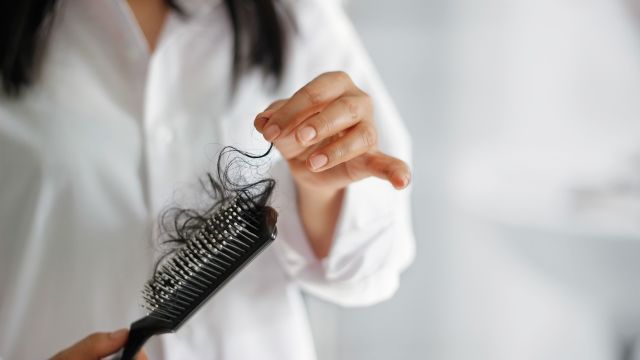There are roughly 150,000 hair follicles on your head, and it’s normal to lose around 50 to 150 strands of hair a day. More than that could indicate a hair loss or regrowth problem, which is commonly caused by styling damage, medications, stress, poor diet—or androgenetic alopecia.
Androgenetic alopecia, a hereditary disorder, affects an estimated 30 million American women. It can present itself prematurely during a woman’s teen years, but usually occurs after menopause.
While other types of alopecia can be caused by tight hairstyles and hair treatments, androgenetic alopecia is triggered by an imbalance of androgens, or male sex hormones. As a result, the body's hair cycle shortens, resulting in thinning hair or patches. Hair loss for women with the condition generally begins at the top of the scalp, and worsens over time. However, it is rare that a woman will become completely bald.
How hair loss affects mental health
There is no cure for androgenetic alopecia, and as a result, it can take a toll on women both emotionally and socially. Many experience poor body image and low self-esteem. According to one study, women who struggle with hair loss may feel self-conscious and embarrassed, and even become jealous of those with hair.
Anxiety and stress are also common among women with hair loss, and can often keep them from social settings. But with the proper diagnosis and treatment, hair loss in women can become manageable.
Diagnosis
Androgenetic alopecia can present itself through a thinner ponytail, a widening part and loss of volume. Family history, blood tests and a pull test, which involves lightly tugging on chunks of hair to determine the stage of hair loss, will help doctors understand what is causing your problem. These tests could also help address other medical conditions related to androgenetic alopecia, such as polycystic ovarian syndrome (PCOS).
Treatment
While there is no permanent cure for androgenetic alopecia, it can be treated with medication. Doctors will often begin treatment by prescribing creams or medication to be applied directly to the scalp, such as minoxidil, which helps speed up the hair growth process to a normal level. These medications have shown to be effective in hair growth or slowing down hair loss, usually with few side effects. Doctors may also prescribe special shampoos, certain birth control pills, prescription medications approved for other uses that also block androgens or hormone therapy to help treat the condition.
Another option is surgery. Hair transplant surgery is a procedure during which hair follicles are implanted into bald or thinning spots on the scalp to help even out hair. Some with androgenetic alopecia may also choose to wear wigs, extensions or hairpieces.
Consult with your doctor if you feel you may be losing too much hair. They will be able to create the right treatment plan for you.






